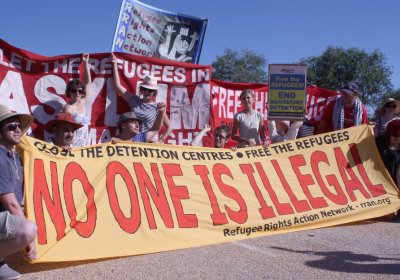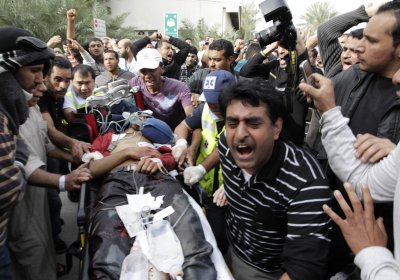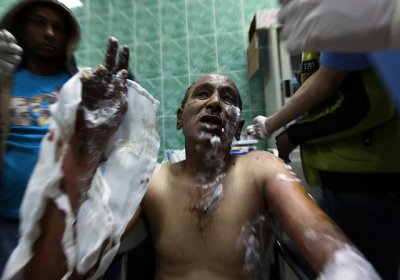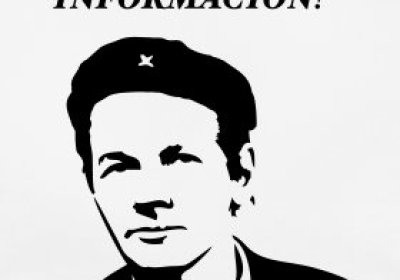Forty refugee rights activists travelled by bus from Perth to Curtin Detention Centre in the remote Kimberley region of WA over the Easter long weekend. Several others joined the convergence at nearby Derby.
This was the latest convergence on a refugee detention centre organised by the Refugee Rights Action Network (RRAN).
Most refugee detention centres are located in remote locations to create a physical divide between refugees and the broader population. The convergence aimed to bridge this divide.
Democracy
Sixty-two protesters had been killed by Syrian security forces on April 29, Al Jazeera reported that day. This was the second Friday in a row that Syrian authorities had used lethal forces against protesters — 100 protesters were killed in Deraa on April 22.
The United States responded by imposing sanctions on three leading figures in the regime — including President Bashar al-Assad’s brother, but not the president — and the Syrian intelligence agency.
A request by the United Nations special rapporteur on torture, Juan Mendez, to visit alleged WikiLeaks whistleblower, United States soldier Bradley Manning, was denied in April.
At the time, Manning was being held in solitary confinement at Marine Corps Brig, Quantico in Virginia.
Speaking through his lawyer, Manning accused the guards at Quantico of treating him differently to other prisoners and reported he had been forced to strip naked by guards every night.
Mendez said US authorities had “not been receptive to a confidential meeting” with Manning.
The US-led military operation in Libya has morphed from the initial imposition of a “no-fly zone” — ostensibly to prevent Muammar Gaddafi’s regime from carrying out a massacre — into an ongoing bombing campaign with no end in sight.
And now there’s increasing talk of the use of ground forces until Gaddafi is overthrown and a new government, no doubt Western-approved, takes his place.
Libya discussion
Left wrong to oppose military intervention
Two wars in Libya
The release of secret US Department of Defense files on prisoners held by the US as part of the “war on terror” confirms, in the US government’s own words, the shoddy and unreliable nature of the “evidence” used to condemn prisoners at its Guantanamo Bay torture camp.
The files released by WikiLeaks also show the mentality of the US government in its attempts to prosecute and gather information about “terrorists” to justify its wars of aggression. Apart from those known to be innocent by their US captors, many others were condemned on the flimsiest of pretexts.
A number of left groups in Venezuela and solidarity groups internationally have expressed concern over the April 23 decision by Venezuelan authorities to arrest well-known Colombian journalist and supporter of the Venezuelan revolution, Joaquin Perez Becerra.
Perez Becerra was arrested when he tried to enter the country through Caracas Airport. He was deported two days later to neighbouring Colombia to face trial for supposed “terrorism” charges in Colombia.
It’s wonderful that WikiLeaks and Julian Assange are getting good publicity and support for their great efforts exposing the lies and deceptions of the US, Israel and others. But I also would like to draw some attention to the fate of two Israeli whistleblowers and political prisoners held in Israel, Mordechai Vanunu and Anat Kamm.
In 1986, Vanunu took a courageous moral stand against nuclear weapons. Vanunu exposed Israel’s secret nuclear weapons arsenal to the world after becoming disillusioned with his work at Dimona Nuclear Research Centre in Israel.
WikiLeaks released a new slew of secret US military documents on April 24 relating to the US off-shore detention facility Guantanamo Bay. The Guantanamo Files were released by WikiLeaks and its media partners as 779 documents that dealt specifically with detainees.
The documents included classified assessments, interviews and internal memos written by the Pentagon’s Joint Task Force at Guantanamo marked “secret” and “noform” — no information to be shared with representatives of other countries.
Sydney's Marrickville council is coming under increasing pressure to overturn a resolution it passed in December in support of the boycott, divestment and sanctions (BDS) campaign against Israel.
NSW Liberal Premier Barry O’Farrell has threatened to use his powers under the Local Government Act to sack the council unless the resolution is overturned.
The Venezuelan government has repeated its request to the United States government for the extradition of terrorist and ex-CIA agent Luis Posada Carriles. Posada Carriles was found not guilty by a Texas court on April 8 of charges of violating US immigration law.
Posada Carriles is wanted by Venezuela for his role in blowing up a Cuban plane in 1976. The plane’s 73 passengers, all civilians, were killed. Posada Carriles escaped from a Venezuelan prison in 1985.
Venezuela’s foreign ministry issued the statement abridged below on April 8.
* * *
Pro-democracy protesters in Yemen have shown their determination for real change by rejecting a proposal that would allow hated President Ali Abdullah Saleh to leave power on his own terms and escape prosecution for his crimes.
In the face of ongoing repression, the opposition rejected a proposal from the Gulf Cooperation Council (GCC) and maintained their demand that Saleh leave immediately, Al Jazeera said on April 11.
Two wars are being waged simultaneously in Libya. One has grown out of a revolutionary struggle for democracy. The other is an attempt by imperialism to strengthen its domination of the country.
Both wars appear to share the goal of “regime change”, but they stand at opposite ends of the political spectrum.
The regime change that the revolutionary struggle seeks to achieve is the overthrow of the Muammar Gaddafi dictatorship and the establishment of a system of democratic rule.
- Previous page
- Page 487
- Next page






